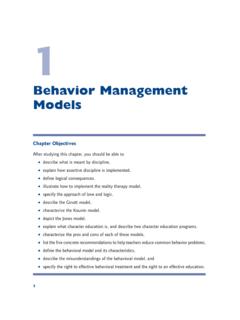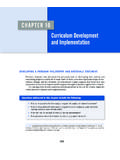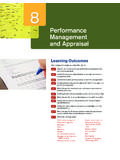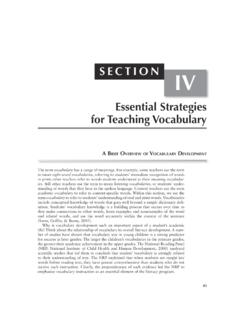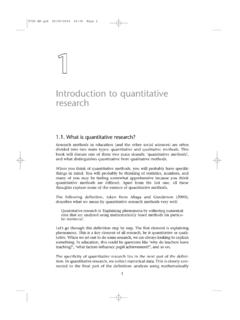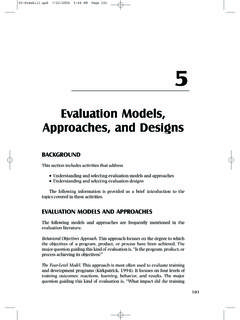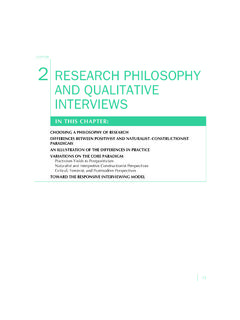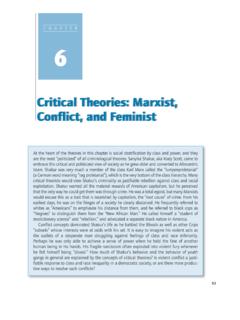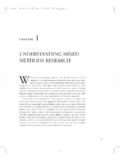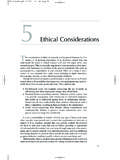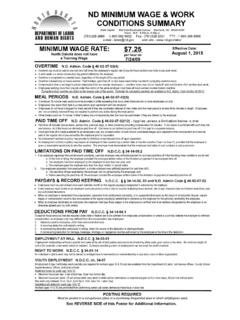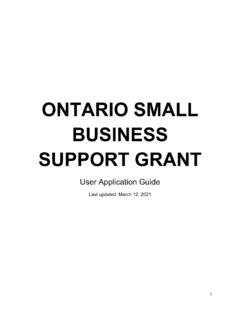Transcription of Models of 12 Assessment - SAGE Publications Inc
1 12 Models of AssessmentJanine Bolger and Patrick WalkerKey Themes Assessment is a core activity of social work practices, which should be a process capable of responding to dynamic factors in the lives of service users. Assessment is underpinned by a series of principles that serve to guide and direct practice. The legal and policy context of Assessment is essential to understand as this sets a mandate for appropriate social work practice. Models and frameworks for Assessment provide guides for practitioners and are underpinned by the skills and knowledge to inform the what , how and why of Assessment .
2 Assessment is founded on partnership with service users, but may be undertaken in both voluntary and involuntary concept of Assessment is generally associated with notions of appraisal, making judgements, forming opinions or calculating the value of something. Whilst these provide a helpful starting point, they require much further examination when applied to a social work context, where Assessment is a discrete, core activity and a key skill. This chapter will introduce you to elements of social work Assessment , incorporating principles, context, Models , frameworks, skills and practice issues.
3 It will draw reference from across the range of service user groups and invites you to reflect on and critically explore the material. To begin to understand the meaning of Assessment in social work, consider your understanding of Assessment in your day-to-day life. Everyone makes numerous assessments every day in order to navigate their way through the daily interactions and situations that they face. In making these day-to-day assessments you will use a wide variety of perspectives that give meaning to the information that is presented, or help sift the information that is presented or found.
4 Perhaps personal experience 16915/01/2014 2:31:54 PMAssessment170helps you, or perhaps your own cultural beliefs offer a way of interpreting situations or environments. Some of these factors will have relevance to Assessment in social work and highlight the importance of being Assessment IN SOCIAL WORKD espite the large body of literature regarding Assessment in social work, it remains a much debated area, not least because of the variety of approaches, perspectives and frameworks that are available. There is certainly agreement that Assessment is a core activity but less consensus on what actually constitutes a good Assessment and whether Assessment is separate or integral to intervention.
5 Coulshed and Orme (2012) describe Assessment as an ongoing process, which is participatory, seeks to understand the service user and his/her situation and sets a basis for planning how change or improvement can be achieved. In a similar vein, Payne (2008) identifies Assessment as something that is continuous and ought to be part of a cycle. In this respect Assessment is seen as a process rather than an event; although Payne highlights that practice reality often does not reflect this. Emphasising the process aspects, Milner and O Byrne (2009) put forward a framework for Assessment with five key stages:1 Preparing for the Collecting data from all Applying professional knowledge to analyse, understand and interpret the informa-tion Making Deciding and/or our purposes we would propose to define Assessment in social work as a structured activity with the characteristics shown in Figure OF ASSESSMENTThe purpose of this section is to offer some principles, or core common features, of Assessment .
6 The discussion here cannot be prescriptive, but rather is indicative, for reasons that will become apparent. Assessments are frequently context-specific and consequently are shaped by the inclusion of particular elements and influenced by the manner in which the Assessment is undertaken. Case StudyConsider the following three different types of Assessment that may take place under the auspices of services for children and young 17015/01/2014 2:31:54 PMModels of Assessment1711 An Assessment in a family centre may focus on elements of parenting capacity , or parent child A comprehensive Assessment for a Children s Hearing (in Scotland) may require capturing a much wider picture of the child in the context of his/her family, school/community and social setting.
7 3 An Assessment in a Youth Justice team may employ a standardised, structured Assessment focusing on specialised areas related to a consequence, we need to be very clear about our role, remit and the context of any Assessment . Guiding principles help clarify and direct practice in all areas of Assessment . They may be drawn from ethical frameworks, theoretical perspectives, legal obligations and practice guidance and are important because, although various frameworks can be AssessmentPurposefuland appropriateDynamic andresponsiveBased onengagementand inclusionEthical andskilledGrounded in thelegal and policycontextEmpoweringand outcomesfocusedHighlightsprotection andsafe-guardingHolistic andcomprehensiveInvolvesjudgement tosupportdecision-makingLeads toplanning andfuture actionFigure Structure of Assessment in social 17115/01/2014 2:31.
8 55 PMAssessment172used in Assessment , it should be remembered that, as Statham and Kearney point out, social work can never be a purely technical activity based simply on Assessment formats, Models or methods (2007: 102, emphasis added). This suggests that some underpinning and orientating principles are required when beginning and undertaking the Assessment process. Five key principles are presented 1: Understanding NeedDaniel (2007: 116) states clearly that need can offer a guiding principle for the social worker ; it orientates the practitioner towards exploring and understanding the service user s situation.
9 In some cases, need will be immediate, for example in situations of child or adult protection. In other cases, need may emerge over a longer period and relate to support and quality of life, for example befriending to address social isolation. Horder (2002: 117) notes that good Assessment in social work has always been needs-led , although he alerts the reader to the fact that need can be understood differently by people and can become a contested concept. Horder goes on to suggest that need is in most cases defined by others rather than as perceived by the person being assessed.
10 This is the practitioner s dilemma: how to understand, take into account and respond to the service user s view of their needs, whilst also acting within employers requirements, using professional theories and with normative concepts of need in (2012) offers the following:The idea of need refers to: the kinds of problem which people experience; requirements for some particular kind of response; and a relationship between problems and the responses available. A need is a claim for service ..and points the reader towards Bradshaw s (1972) taxonomy of need, summarized as: Normative need, which is identified according to a norm (or set standard); such norms are generally set by experts.
